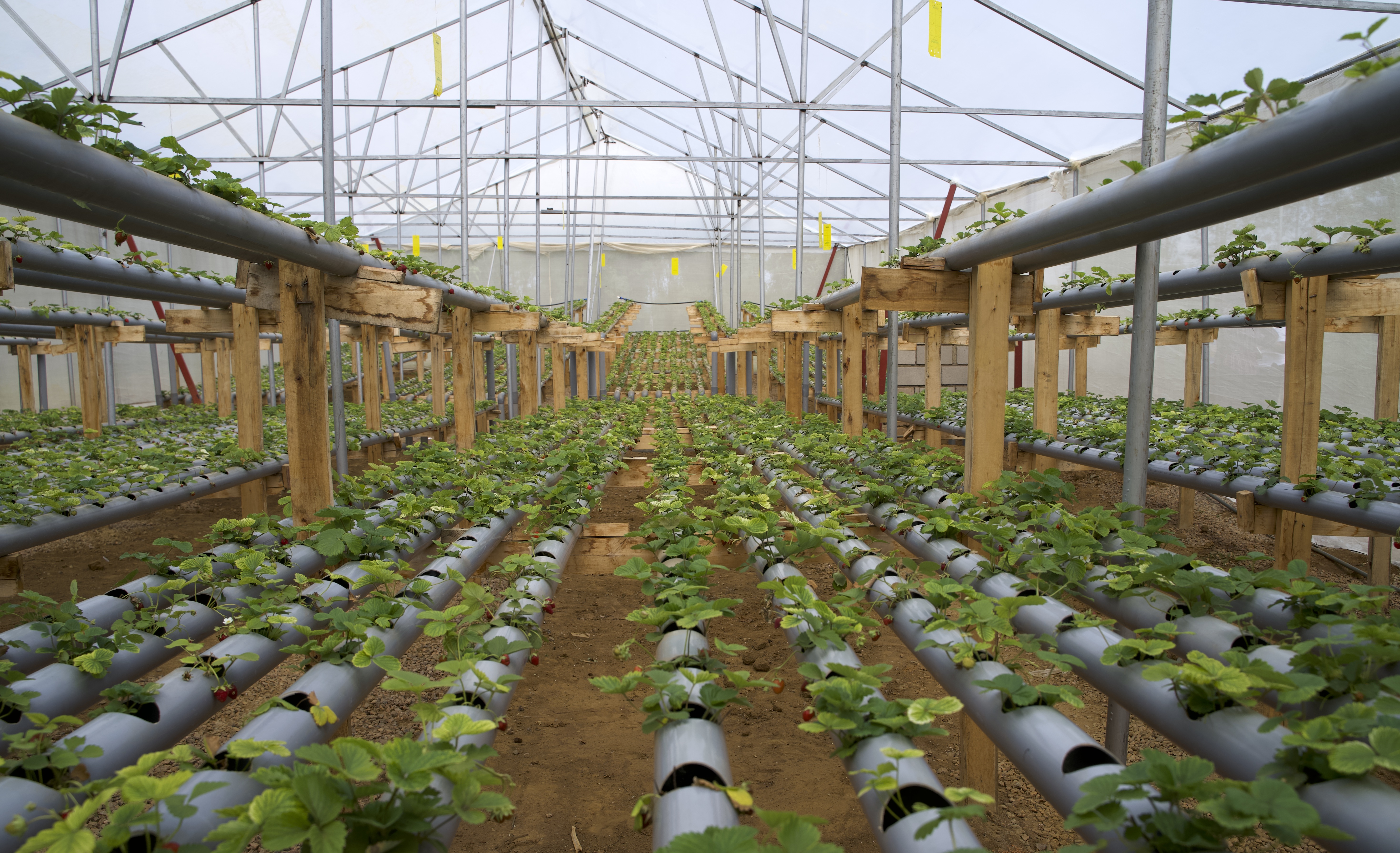By Immaculee Uwimana
Rwandan youth leading the way in agricultural resilience
June 5, 2023

Hydroponic strawberry farming in Bugesera by Germin 8 Rwanda Ltd
Rwanda’s agricultural sector, highly vulnerable to climate change, is experiencing a transformation led by innovative young farmer entrepreneurs. Their initiative in building climate-resilient agricultural businesses is central to the country’s ability to expand food production in the face of mounting climate-related natural disasters.
The latest disaster hit Northern, Western and Southern provinces on May 2 and 3, 2023. Floods and landslides claimed the lives of over 130 people, over 3,000 hectares of arable land destroyed and displaced more than 18,000 people. Major roads, bridges, hydropower plants, factories, and schools were destroyed or damaged. Villages were washed away. A hospital was destroyed. Crops were lost. The initial estimated budget for recovery efforts amounted to Rwf130 billion.
As the country pursues recovery from the latest disaster, young agricultural entrepreneurs are spearheading a longer-term transformation of Rwandan agriculture.
Rurangwa Sam is part of that vanguard. Rurangwa had always loved farming. In 2018, he started a passion fruit farm in Kayonza district, with a loan of just US$800 from a relative. But as the rains failed, he quickly realized that he needed more resources if his farm was to survive.

Sam Rurangwa standing in front of his irrigated passion fruit farm
Through a partnership between UNDP and the Ministry of Agriculture and Animal Resources (MINAGRI) that supports youth-led climate-resilient projects across the country, Rurangwa received a grant of $7,000. It enabled him to expand and diversify his farm and invest in an irrigation system. His income increased along with his farm yields, reaching $15,000 in just one year from $1,200 previously. Rurangwa's success also provided jobs for 20-25 workers, predominantly women, helping them pay for healthcare and education, and benefiting the broader community.
Bankunde Charlotte in Bugesera District runs a green bean farm. To manage through periods of drought, she also received irrigation equipment through the partnership. With improved productivity and a rising income, Charlotte expanded her business, creating job opportunities for more than 500 individuals during each season—whom she further supported by personally paying for their health insurance (mutuelle de santé).
The Head of the Sustainable Growth Unit at UNDP Rwanda, Bernardin Uzayisaba, notes that support for young entrepreneurs, especially in the agricultural sector, is a priority for UNDP Rwanda. He acknowledged their potential to transform the sector: "We are proud of their achievements. So far, we have supported 108 climate-resilient youth-led agriculture projects, including horticulture, fruit farming, cash crops, livestock, agroforestry, hydroponics, and more. The support has gone to 57 male and 51 female entrepreneurs, helping to advance gender equality in Rwanda's agriculture sector. Their innovative and sustainable solutions to climate change have the potential to transform agriculture and ensure food security for generations to come.”
Another one of those projects is the youth of Uruhimbi Cooperative in Gicumbi district. Cooperative members embraced hydroponics as a remarkable remedy to climate disasters. With the challenges such as water scarcity, soil degradation, and extreme weather events, hydroponics offered an innovative solution. They were supported to use soil-less cultivation methods which allow plants to grow in nutrient-rich water, using significantly less water and land compared to conventional farming.

Fodder grass farming in hydroponic system in Gicumbi by Uruhimbi Cooperative UKC .In the picture is Deborah Tuyishime a member of Uruhimbi Cooperative UKC
As Jean De Dieu Iradukunda, the president of the cooperative said, “Hydroponics helped them to mitigate the impacts of climate change by growing fresh produce in controlled environments, independent of external climatic conditions, thus not only boosting food security but also promoting resource efficiency, reducing greenhouse gas emissions, and empowering them to actively contribute to climate resilience.”
Climate crisis and its impact
Rising temperatures that are twice the global average in Africa contribute to the frequency and intensity of extreme weather events. Both drought and flooding raise concerns about potential famine due to the loss of crops and livestock.
Rwandan youth are leading the way in building climate-resilient agricultural projects despite the challenges posed by the climate crisis and recent disasters. Among the innovations needed are both irrigation systems to cope with drought and improved water management during excessive rains, and reforestation can combat landslides and soil erosion (nearly 600 million tonnes of soil is lost annually in Rwanda because of torrential rain). Farmers also need access to climate-ready crops, timely weather, and climate data, and decentralized alternative energy in farming areas.
Through partnerships, grants, and innovative approaches, young farmers are transforming the agricultural sector and contributing to sustainable development. However, the floods and landslides underscore the urgency of climate change adaptation.

 Locations
Locations

